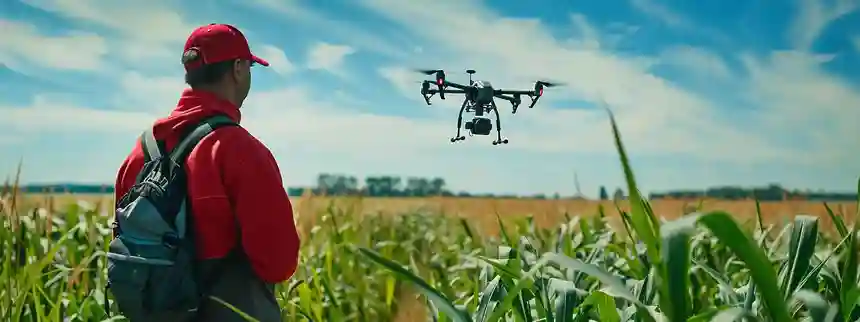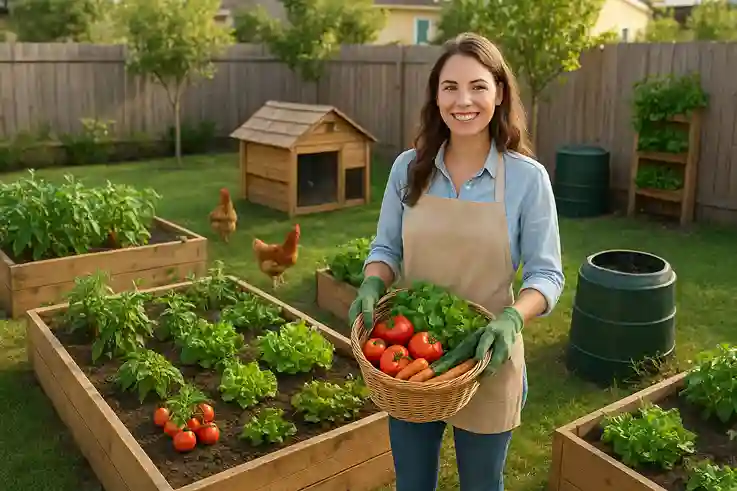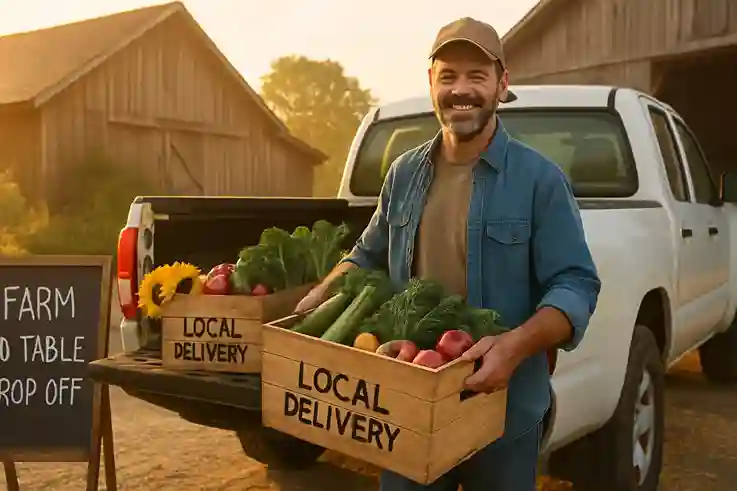Farming Careers to Watch in the Next Decade
The future of farming careers is growing beyond traditional work in fields, barns, and tractors. Modern agriculture is changing fast. Technology, sustainability, and science are reshaping how we produce food in the United States. From smart sensors to climate-resilient crops, innovation is driving new opportunities.
As farming challenges increase, so does the need for skilled and educated workers. Farming careers are expanding into areas like precision tech, soil science, and logistics. These jobs are vital for food supply, environmental care, and economic growth.
Whether you’re into biology, business, or machines, there’s a place for you in modern agriculture. Many of these roles don’t require farming experience or a four-year degree. They offer real-world impact, steady pay, and a clear future path.
This guide will explore the top emerging farming careers for the next decade. You’ll find expert insights, salary data, and growth forecasts to help you decide your path. If you’re ready to rethink what a farming job can look like, you’re in the right place.
Why Farming Careers Matter Now More Than Ever
Farming careers are more critical today than they’ve ever been. The world faces a growing population, unpredictable climate, and food insecurity. U.S. farmers are under pressure to produce more with less. That means smarter systems and highly skilled labor are essential.
With extreme weather and resource shortages, the farming industry must adapt or fall behind. Farming careers in climate-smart roles—like crop modeling or sustainable water use—are now in high demand. These roles help farms stay productive and environmentally responsible.
Technology is also reshaping the way farms operate. Drones, AI software, and precision tools require trained professionals, not just hands-on labor. Many farming careers now resemble tech or engineering jobs more than traditional agriculture. This shift opens the door to new talent with STEM skills.
There’s also an aging workforce problem. A large percentage of U.S. farmers are nearing retirement. New generations need to fill the gap with fresh ideas. As demand grows, so do the job opportunities in sustainable and high-tech farming.
Ultimately, farming careers are the foundation of national food security. Without skilled professionals, our supply chains become vulnerable. These jobs aren’t just about planting—they’re about protecting lives, land, and livelihoods.
Traditional Farming Careers Still in Demand
Despite new technologies, many farming careers remain rooted in tradition. Hands-on roles in crops and livestock continue to form the backbone of agriculture. These positions are evolving but still essential to national food systems.
Crop Producers and Equipment Operators
Crop production is still a cornerstone of American agriculture. Farmers grow staple crops like corn, wheat, and soybeans across the U.S. Modern crop producers use GPS, automated tractors, and soil data to optimize output. But they still rely on human judgment and weather awareness.
Equipment operators now work with machines that require digital skills. This includes monitoring systems, calibrating harvesters, and using mapping software. According to the Bureau of Labor Statistics (BLS), the median pay for equipment operators is about $38,000 per year. However, skilled operators with tech expertise can earn over $50,000.
Even with automation, crop jobs aren’t disappearing. They’re shifting to blend traditional know-how with tech fluency. These farming careers are ideal for people who enjoy fieldwork and operating machinery.
Livestock and Dairy Specialists
The livestock and dairy sectors are also adapting. Animal health, ethical treatment, and climate-friendly practices are shaping how specialists work today. These roles include cattle handlers, breeders, feed technicians, and milking system managers.
Salaries vary by experience and region. USDA data shows dairy farmworkers average around $33,000 per year, but specialists in herd health or breeding earn more. Employment remains stable, and farms are seeking workers with training in animal science or nutrition.
These farming careers offer opportunities for workers passionate about animals and sustainability. As consumer demand shifts toward humane and organic products, skilled labor is more essential than ever.
Farming Careers in Agri-Tech & Innovation
Technology is driving the next wave of farming careers in the U.S. Precision tools, data analytics, and robotics are reshaping how farms operate. These careers offer high-growth potential, competitive salaries, and exciting work for tech-savvy individuals.
Precision Agriculture Technician
Precision agriculture is changing how we grow food. Technicians use GPS, drones, and Internet of Things (IoT) devices to map fields and monitor soil. This helps farmers make data-based decisions that improve yield and reduce waste.
Technicians work directly on farms or with ag-tech companies. Tasks include drone flight operations, troubleshooting sensors, and software calibration. It’s hands-on but tech-forward work. A background in agricultural technology or environmental science helps.
According to ZipRecruiter, the average salary for a precision ag tech is around $51,000. Advanced certifications or equipment expertise can raise that closer to $70,000. These farming careers appeal to those who enjoy fieldwork and digital tools.
Ag Data Analyst
Farms generate massive amounts of data today—from weather to crop health. Ag data analysts interpret this information to help farms operate efficiently. They create reports, build models, and advise on planting decisions.
This role often requires a bachelor’s in data science, agronomy, or a related field. Analysts may work for ag-tech firms, seed companies, or major farms. SQL, Excel, and geographic data tools are often used.
Glassdoor reports the average salary at $68,000 per year, with senior roles exceeding $90,000. These farming careers are ideal for people who love numbers and agricultural problem-solving.
Robotics & Automation Engineer (Farming Sector)
The farming industry needs engineers to build smart machines. These include seeders, robotic harvesters, and automated sorters. Engineers integrate AI, sensors, and mechanical design to improve speed and reduce labor.
Most employers look for degrees in robotics, mechanical engineering, or ag-engineering. Experience with C++, CAD, and machine learning is valuable. Roles are often with ag-startups or equipment manufacturers.
According to the BLS, agricultural equipment engineers earn a median salary of $85,000. These farming careers merge innovation with impact—perfect for those who want to modernize food production.
Green Farming Careers for a Sustainable Future
As climate concerns rise, farming careers focused on sustainability are gaining momentum. These roles help preserve resources while feeding a growing population. They appeal to environmentally driven individuals who want to make a real difference in agriculture.
Soil and Water Conservationist
Soil and water conservationists protect natural resources on farmland. They advise on erosion control, irrigation methods, and land use plans. Their work helps farms remain productive while reducing environmental damage.
Climate change is making this job more important than ever. Conservationists work with private farms, government agencies, and nonprofits. A degree in environmental science, agronomy, or soil science is often required.
According to the U.S. Bureau of Labor Statistics (BLS), conservation scientists earn a median salary of $68,230. Job growth is expected to remain steady through 2032. These farming careers are vital for climate-smart agriculture.
Regenerative Farming Specialist
Regenerative agriculture restores soil health, captures carbon, and builds ecosystem resilience. Specialists guide farmers on practices like cover cropping, no-till planting, and rotational grazing.
This role often involves on-farm work and education. Many specialists work with cooperatives, extension offices, or sustainable agriculture nonprofits. Skills include soil testing, organic methods, and public speaking.
Training can be obtained from land-grant universities or certifications like the Rodale Institute’s program. Salaries range widely but often start at $45,000–$60,000, depending on region and experience.
These farming careers are ideal for those passionate about healing the planet through food systems. They’re not just jobs—they’re missions.
Farming Careers in Education, Policy & Support
Not all farming careers take place on the field or in a greenhouse. Some of the most critical roles in agriculture involve education, outreach, and public policy. These professionals influence how farms operate, how resources are allocated, and how communities grow.
Agricultural Extension Officer
Agricultural extension officers serve as a bridge between research and real-world farming. They help farmers apply science-backed techniques to improve yields and conserve resources. These farming careers focus on hands-on education, workshops, and one-on-one farm visits.
Officers are usually employed by universities, state agencies, or cooperative extension services. They educate on topics like pest management, water use, and crop selection. Public speaking and teaching are key components of this job.
A degree in agricultural science, biology, or environmental education is common. Some states also require specific certifications. These roles often start with salaries between $50,000 and $70,000 annually, depending on location and experience.
Extension officers are essential in making sure innovations reach those who need them most—local farmers and rural communities.
Farm Policy Analyst
Farm policy analysts work behind the scenes shaping the laws that affect American agriculture. They interpret legislation, track policy changes, and provide recommendations. These farming careers are perfect for those with a knack for research and public service.
Analysts often work for federal agencies, think tanks, or advocacy groups. They may focus on food security, land use, subsidies, or trade regulations. Strong analytical skills and an understanding of agricultural systems are crucial.
Most analysts have degrees in public policy, economics, or agricultural law. According to Glassdoor, average salaries range from $60,000 to $85,000. Senior-level roles can pay even more.
These careers play a vital role in ensuring farming stays equitable, efficient, and future-ready.
Farming Careers to Watch: The Next Decade in Numbers
Below is a snapshot of emerging farming careers, their earning potential, growth trends, and education requirements. These roles reflect where agriculture is heading in the U.S.—more tech-savvy, sustainable, and specialized than ever before.
| Career Title | Median Salary | Growth Outlook | Training Needed |
|---|---|---|---|
| Precision Ag Technician | $55,000 | High | Associate’s or Bachelor’s |
| Soil Scientist | $63,000 | Moderate | Bachelor’s or higher |
| Agricultural Policy Analyst | $72,000 | Moderate | Bachelor’s or Master’s |
| Dairy Technologist | $48,000 | Steady | Bachelor’s |
| Regenerative Farm Consultant | $60,000 | High | Certification or Bachelor’s |
These farming careers reflect the shifting priorities of agriculture—balancing productivity, tech innovation, and environmental stewardship.
Conclusion: The Future of Farming Careers Is Now
Farming careers are no longer confined to fields and barns. Agriculture today is smart, data-driven, and sustainability-focused. Whether it’s running drones over cornfields or writing climate policy for future food systems, the industry is evolving faster than ever before.
The U.S. farming landscape needs skilled minds—from tech-savvy engineers to passionate educators and conservationists. And the best part? There’s a place for every skill set and background.
So, whether you’re fresh out of school, looking for a career shift, or just curious, now’s the time to explore these modern farming careers. The future of food, climate, and innovation depends on people like you.
FAQ
Q1: What are the best-paying farming careers right now?
Some of the highest-paying farming careers include Ag Policy Analyst, Agricultural Engineer, and Precision Agriculture Technician, with salaries ranging from $55,000 to over $90,000, depending on experience and education.
Q2: Do I need a college degree for a career in agriculture?
Not always. Many careers, such as Regenerative Farming Specialist or Equipment Operator, may only require certifications or associate degrees. Others, like Ag Data Analysts or Soil Scientists, typically need a bachelor’s or higher.
Q3: Is farming still a viable career in the U.S.?
Yes—farming careers are evolving, not disappearing. With the rise of sustainability, climate action, and food security concerns, skilled professionals are in high demand across the agricultural sector.
Q4: Can I get into agriculture if I don’t come from a farm background?
Absolutely. Today’s farming industry values diverse skills. Whether your background is in tech, business, science, or education, there’s likely a farming career that fits your expertise.
Q5: What resources can help me start a farming career?
Look into land-grant universities, USDA programs, local extension offices, and online certifications through platforms like AgCareers or Farm Bureau for accessible pathways.
💬 Have you thought about a career in agriculture? Which of these roles excites you most? Drop a comment and join the conversation!

Nick William is a dedicated travel blogger with a passion for uncovering hidden destinations and sharing authentic experiences from around the world. With a background in digital media and storytelling, he has developed a unique style that combines detailed research, vivid descriptions, and personal insights. His goal is to help readers not only plan their journeys but also connect with the culture, people, and stories behind each place.
When Nick isn’t exploring new cities or trekking off-the-beaten paths, he enjoys capturing moments through photography, reading history books, and sipping coffee while drafting his next adventure. His writing brings destinations to life, making every reader feel like a fellow traveler on the journey.


